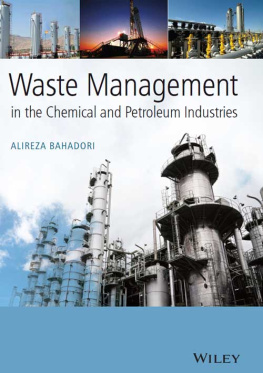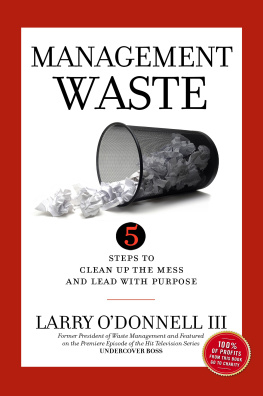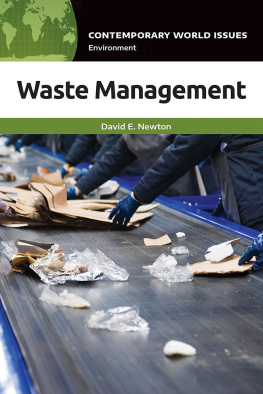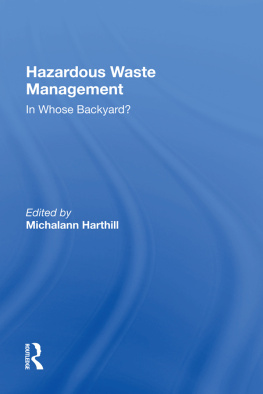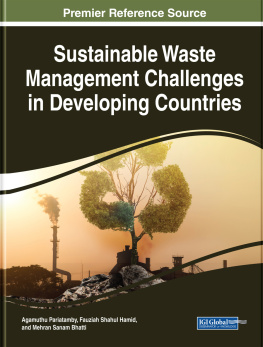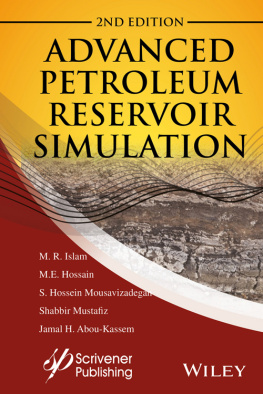Bahadori - Waste management in the chemical and petroleum industries
Here you can read online Bahadori - Waste management in the chemical and petroleum industries full text of the book (entire story) in english for free. Download pdf and epub, get meaning, cover and reviews about this ebook. year: 2013, publisher: John Wiley & Sons Inc., genre: Science. Description of the work, (preface) as well as reviews are available. Best literature library LitArk.com created for fans of good reading and offers a wide selection of genres:
Romance novel
Science fiction
Adventure
Detective
Science
History
Home and family
Prose
Art
Politics
Computer
Non-fiction
Religion
Business
Children
Humor
Choose a favorite category and find really read worthwhile books. Enjoy immersion in the world of imagination, feel the emotions of the characters or learn something new for yourself, make an fascinating discovery.
Waste management in the chemical and petroleum industries: summary, description and annotation
We offer to read an annotation, description, summary or preface (depends on what the author of the book "Waste management in the chemical and petroleum industries" wrote himself). If you haven't found the necessary information about the book — write in the comments, we will try to find it.
Bahadori: author's other books
Who wrote Waste management in the chemical and petroleum industries? Find out the surname, the name of the author of the book and a list of all author's works by series.
Waste management in the chemical and petroleum industries — read online for free the complete book (whole text) full work
Below is the text of the book, divided by pages. System saving the place of the last page read, allows you to conveniently read the book "Waste management in the chemical and petroleum industries" online for free, without having to search again every time where you left off. Put a bookmark, and you can go to the page where you finished reading at any time.
Font size:
Interval:
Bookmark:


This edition first published 2014
2014 John Wiley & Sons, Ltd
Registered office
John Wiley & Sons Ltd, The Atrium, Southern Gate, Chichester, West Sussex, PO19 8SQ, United Kingdom
For details of our global editorial offices, for customer services and for information about how to apply for permission to reuse the copyright material in this book please see our website at www.wiley.com . The right of the author to be identified as the author of this work has been asserted in accordance with the Copyright, Designs and Patents Act 1988.
All rights reserved. No part of this publication may be reproduced, stored in a retrieval system, or transmitted, in any form or by any means, electronic, mechanical, photocopying, recording or otherwise, except as permitted by the UK Copyright, Designs and Patents Act 1988, without the prior permission of the publisher.
Wiley also publishes its books in a variety of electronic formats. Some content that appears in print may not be available in electronic books.
Designations used by companies to distinguish their products are often claimed as trademarks. All brand names and product names used in this book are trade names, service marks, trademarks or registered trademarks of their respective owners. The publisher is not associated with any product or vendor mentioned in this book. This publication is designed to provide accurate and authoritative information in regard to the subject matter covered. It is sold on the understanding that the publisher is not engaged in rendering professional services. If professional advice or other expert assistance is required, the services of a competent professional should be sought.
The publisher and the author make no representations or warranties with respect to the accuracy or completeness of the contents of this work and specifically disclaim all warranties, including without limitation any implied warranties of fitness for a particular purpose. This work is sold with the understanding that the publisher is not engaged in rendering professional services. The advice and strategies contained herein may not be suitable for every situation. In view of ongoing research, equipment modifications, changes in governmental regulations, and the constant flow of information relating to the use of experimental reagents, equipment, and devices, the reader is urged to review and evaluate the information provided in the package insert or instructions for each chemical, piece of equipment, reagent, or device for, among other things, any changes in the instructions or indication of usage and for added warnings and precautions. The fact that an organization orWebsite is referred to in this work as a citation and/or a potential source of further information does not mean that the author or the publisher endorses the information the organization or Website may provide or recommendations it may make. Further, readers should be aware that Internet Websites listed in this work may have changed or disappeared between when this work was written and when it is read. No warranty may be created or extended by any promotional statements for this work. Neither the publisher nor the author shall be liable for any damages arising herefrom.
Library of Congress Cataloging-in-Publication Data
Bahadori, Alireza.
Waste management in the chemical and petroleum industries / Alireza Bahadori.
1 online resource.
Includes index.
Description based on print version record and CIP data provided by publisher; resource not viewed.
ISBN 978-1-118-73171-0 (MobiPocket) ISBN 978-1-118-73172-7 (Adobe PDF) ISBN 978-1-118-73173-4 (ePub) ISBN
978-1-118-73175-8 (cloth) (print) 1. Petroleum industry and tradeWaste disposal. 2. Chemical industryWaste disposal.
3. Petroleum refineriesWaste disposal. I. Title.
TD899.P4
628.51dc23
2013021840
A catalogue record for this book is available from the British Library.
ISBN: 9781118731758 (13 digits)
Dedicated to the loving memory of my Parents, grandparents, and to all
who contributed so much to my work over the years.
Preface
Oil and gas are major sources of energy and revenue for many countries today their production has been described as one of the most important industrial activities in the twenty-first century and obviously waste treatment and disposal assume a greater degree of importance in the petroleum, chemical processing, and unconventional oil and gas industries.
Wastewater quality and the quantity produced determine the means of disposal and the costs of disposal. Suspended solids, total dissolved solids, and oxygen demand of produced waters have the most impact on wastewater treatment.
Wastewater is a complex mixture of organic and inorganic compounds and the largest byproduct by volume generated during chemical processing and both conventional and unconventional oil and gas recovery operations. The potential of oilfield-produced water to be a source of freshwater for water-stressed oil-producing countries and increasing environmental concerns, in addition to stringent legislations on produced water discharge into the environment, have made produced water management a significant part of the oil and gas business.
In marginally economic coal bed projects, the water disposal costs and attendant environmental accounting are critical factors in the investment decision; water disposal costs can economically make or break a marginal project.
Before investing in a coal bed methane (CBM) process, multiple questions need to be answered concerning the water to be produced questions concerning quantity, flow-rates, chemical content, disposal means, monitoring, and environmental regulations. Perhaps no other factor affects the economics and feasibility of CBM projects as much as water removal and disposal.
In heavy oil production, between 2 to 4.5 volume units of water are used to produce each volume unit of synthetic crude oil in an ex situ mining operation. Despite recycling, almost all of it ends up in tailings ponds. However, in Steam Assisted Gravity Drainage (SAGD) operations, 9095% of the water is recycled and about 0.2 volume units of water is used per volume unit of bitumen produced.
A major hindrance to the monitoring of oil sands-produced waters has been the lack of identification of individual compounds present. By better understanding the nature of the highly complex mixture of compounds, including naphthenic acids, it may be possible to monitor rivers for leachate and also to remove toxic components. Such identification of individual acids has for many years proved impossible, but a recent breakthrough in analysis has begun to reveal what is in the oil sands-produced waters.
The extraction and use of shale gas can affect the environment through the leaking of extraction chemicals and waste into water supplies, the leaking of greenhouse gasses during extraction, and the pollution caused by the improper processing of natural gas.
A challenge to preventing pollution is that shale gas extractions vary widely in this regard, even between different wells in the same project; the processes that reduce pollution sufficiently in one extraction may not be enough in another.
Chemicals are added to the water to facilitate the underground fracturing process that releases natural gas. Fracturing fluid is primarily water and approximately 0.5% chemical additives (friction reducer, agents countering rust, agents to kill microorganisms). Since (depending on the size of the area) millions of liters of water are used, this means that hundreds of thousands of liters of chemicals are often injected into the soil.
Font size:
Interval:
Bookmark:
Similar books «Waste management in the chemical and petroleum industries»
Look at similar books to Waste management in the chemical and petroleum industries. We have selected literature similar in name and meaning in the hope of providing readers with more options to find new, interesting, not yet read works.
Discussion, reviews of the book Waste management in the chemical and petroleum industries and just readers' own opinions. Leave your comments, write what you think about the work, its meaning or the main characters. Specify what exactly you liked and what you didn't like, and why you think so.

